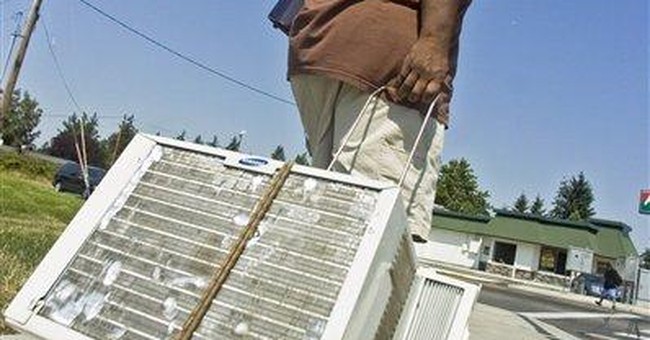excalibur
Diamond Member
- Mar 19, 2015
- 21,524
- 41,598
- 2,290
The left, coming for air conditioning.
Here’s a subject that’s on the minds of a lot of Americans this month, particularly up in the pacific northwest. With temperatures breaking records, people have been scrambling to get air conditioning. People who have never needed it suddenly want it and people who have it want more of it. This has led the helpful folks at Time Magazine to publish a very long “explainer” about the history of modern air conditioning and why it’s a problem. The title is, “AC Feels Great, But It’s Terrible for the Planet. Here’s How to Fix That.”
That sounds promising, right? Because it’s true that the hydrofluorocarbons used in modern AC units aren’t great for the atmosphere and disposing of those annoying window-mounted AC units is a huge pain. So does Time offer us some promising new technology on the horizon to fulfill our 21st air conditioning needs? Allow me to save you some time because, again, that article is sadistically long. (And yes, I read the entire thing so you wouldn’t have to.) As I said, the article begins with the history of air conditioning and how it was originally invented for industrial purposes rather than personal cooling. It then steps through the various incarnations of cooling technology… at great length. Finally, at the very end, we get to the big reveal. What do we do about it? Here you go. (Emphasis added)
So there’s the answer. Air conditioning is on the climate change naughty list, so it needs to go. No, we’re not going to offer you a more climate-friendly way to cool your home. You just need to ditch your AC and get used to being hot and sweaty. For the good of the planet.
All I can say to the article’s author, Eric Dean Wilson, is… up your nose with a rubber hose, pal. (Younger readers may have to ask their parents about that reference.)
...
Here’s a subject that’s on the minds of a lot of Americans this month, particularly up in the pacific northwest. With temperatures breaking records, people have been scrambling to get air conditioning. People who have never needed it suddenly want it and people who have it want more of it. This has led the helpful folks at Time Magazine to publish a very long “explainer” about the history of modern air conditioning and why it’s a problem. The title is, “AC Feels Great, But It’s Terrible for the Planet. Here’s How to Fix That.”
That sounds promising, right? Because it’s true that the hydrofluorocarbons used in modern AC units aren’t great for the atmosphere and disposing of those annoying window-mounted AC units is a huge pain. So does Time offer us some promising new technology on the horizon to fulfill our 21st air conditioning needs? Allow me to save you some time because, again, that article is sadistically long. (And yes, I read the entire thing so you wouldn’t have to.) As I said, the article begins with the history of air conditioning and how it was originally invented for industrial purposes rather than personal cooling. It then steps through the various incarnations of cooling technology… at great length. Finally, at the very end, we get to the big reveal. What do we do about it? Here you go. (Emphasis added)
The troubled history of air-conditioning suggests not that we chuck it entirely but that we focus on public cooling, on public comfort, rather than individual cooling, on individual comfort. Ensuring that the most vulnerable among the planet’s human inhabitants can keep cool through better access to public cooling centers, shade-giving trees, safe green spaces, water infrastructure to cool, and smart design will not only enrich our cities overall, it will lower the temperature for everyone. It’s far more efficient this way.
To do so, we’ll have to re-orient ourselves to the meaning of air-conditioning. And to comfort. Privatized air-conditioning survived the ozone crisis, but its power to separate—by class, by race, by nation, by ability—has survived, too. Comfort for some comes at the expense of the life on this planet.
It’s time we become more comfortable with discomfort. Our survival may depend on it.
So there’s the answer. Air conditioning is on the climate change naughty list, so it needs to go. No, we’re not going to offer you a more climate-friendly way to cool your home. You just need to ditch your AC and get used to being hot and sweaty. For the good of the planet.
All I can say to the article’s author, Eric Dean Wilson, is… up your nose with a rubber hose, pal. (Younger readers may have to ask their parents about that reference.)
...

